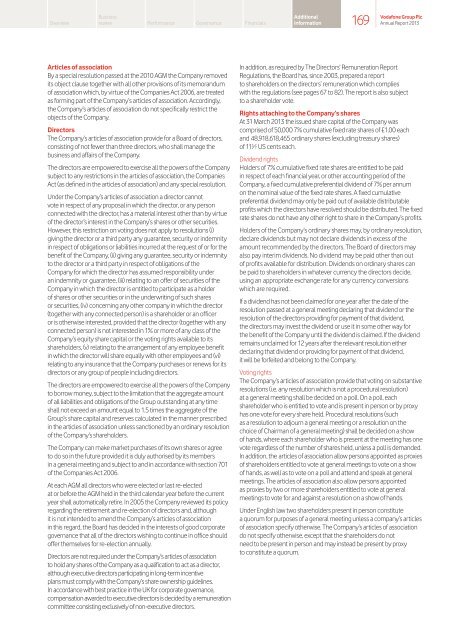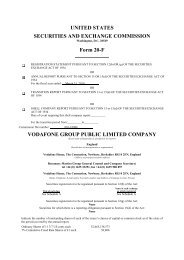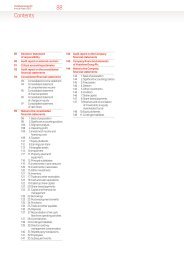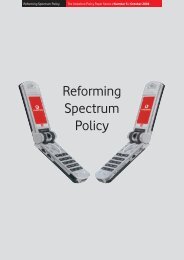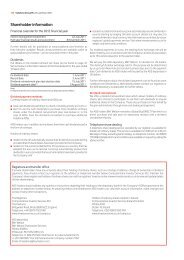The way ahead? - Vodafone
The way ahead? - Vodafone
The way ahead? - Vodafone
Create successful ePaper yourself
Turn your PDF publications into a flip-book with our unique Google optimized e-Paper software.
Overview<br />
Business<br />
review Performance Governance Financials<br />
Articles of association<br />
By a special resolution passed at the 2010 AGM the Company removed<br />
its object clause together with all other provisions of its memorandum<br />
of association which, by virtue of the Companies Act 2006, are treated<br />
as forming part of the Company’s articles of association. Accordingly,<br />
the Company’s articles of association do not specifically restrict the<br />
objects of the Company.<br />
Directors<br />
<strong>The</strong> Company’s articles of association provide for a Board of directors,<br />
consisting of not fewer than three directors, who shall manage the<br />
business and affairs of the Company.<br />
<strong>The</strong> directors are empowered to exercise all the powers of the Company<br />
subject to any restrictions in the articles of association, the Companies<br />
Act (as defined in the articles of association) and any special resolution.<br />
Under the Company’s articles of association a director cannot<br />
vote in respect of any proposal in which the director, or any person<br />
connected with the director, has a material interest other than by virtue<br />
of the director’s interest in the Company’s shares or other securities.<br />
However, this restriction on voting does not apply to resolutions (i)<br />
giving the director or a third party any guarantee, security or indemnity<br />
in respect of obligations or liabilities incurred at the request of or for the<br />
benefit of the Company, (ii) giving any guarantee, security or indemnity<br />
to the director or a third party in respect of obligations of the<br />
Company for which the director has assumed responsibility under<br />
an indemnity or guarantee, (iii) relating to an offer of securities of the<br />
Company in which the director is entitled to participate as a holder<br />
of shares or other securities or in the underwriting of such shares<br />
or securities, (iv) concerning any other company in which the director<br />
(together with any connected person) is a shareholder or an officer<br />
or is otherwise interested, provided that the director (together with any<br />
connected person) is not interested in 1% or more of any class of the<br />
Company’s equity share capital or the voting rights available to its<br />
shareholders, (v) relating to the arrangement of any employee benefit<br />
in which the director will share equally with other employees and (vi)<br />
relating to any insurance that the Company purchases or renews for its<br />
directors or any group of people including directors.<br />
<strong>The</strong> directors are empowered to exercise all the powers of the Company<br />
to borrow money, subject to the limitation that the aggregate amount<br />
of all liabilities and obligations of the Group outstanding at any time<br />
shall not exceed an amount equal to 1.5 times the aggregate of the<br />
Group’s share capital and reserves calculated in the manner prescribed<br />
in the articles of association unless sanctioned by an ordinary resolution<br />
of the Company’s shareholders.<br />
<strong>The</strong> Company can make market purchases of its own shares or agree<br />
to do so in the future provided it is duly authorised by its members<br />
in a general meeting and subject to and in accordance with section 701<br />
of the Companies Act 2006.<br />
At each AGM all directors who were elected or last re-elected<br />
at or before the AGM held in the third calendar year before the current<br />
year shall automatically retire. In 2005 the Company reviewed its policy<br />
regarding the retirement and re-election of directors and, although<br />
it is not intended to amend the Company’s articles of association<br />
in this regard, the Board has decided in the interests of good corporate<br />
governance that all of the directors wishing to continue in office should<br />
offer themselves for re-election annually.<br />
Directors are not required under the Company’s articles of association<br />
to hold any shares of the Company as a qualification to act as a director,<br />
although executive directors participating in long-term incentive<br />
plans must comply with the Company’s share ownership guidelines.<br />
In accordance with best practice in the UK for corporate governance,<br />
compensation awarded to executive directors is decided by a remuneration<br />
committee consisting exclusively of non-executive directors.<br />
Additional<br />
information<br />
169<br />
<strong>Vodafone</strong> Group Plc<br />
Annual Report 2013<br />
In addition, as required by <strong>The</strong> Directors’ Remuneration Report<br />
Regulations, the Board has, since 2003, prepared a report<br />
to shareholders on the directors’ remuneration which complies<br />
with the regulations (see pages 67 to 82). <strong>The</strong> report is also subject<br />
to a shareholder vote.<br />
Rights attaching to the Company’s shares<br />
At 31 March 2013 the issued share capital of the Company was<br />
comprised of 50,000 7% cumulative fixed rate shares of £1.00 each<br />
and 48,918,618,465 ordinary shares (excluding treasury shares)<br />
of 113 ⁄7 US cents each.<br />
Dividend rights<br />
Holders of 7% cumulative fixed rate shares are entitled to be paid<br />
in respect of each financial year, or other accounting period of the<br />
Company, a fixed cumulative preferential dividend of 7% per annum<br />
on the nominal value of the fixed rate shares. A fixed cumulative<br />
preferential dividend may only be paid out of available distributable<br />
profits which the directors have resolved should be distributed. <strong>The</strong> fixed<br />
rate shares do not have any other right to share in the Company’s profits.<br />
Holders of the Company’s ordinary shares may, by ordinary resolution,<br />
declare dividends but may not declare dividends in excess of the<br />
amount recommended by the directors. <strong>The</strong> Board of directors may<br />
also pay interim dividends. No dividend may be paid other than out<br />
of profits available for distribution. Dividends on ordinary shares can<br />
be paid to shareholders in whatever currency the directors decide,<br />
using an appropriate exchange rate for any currency conversions<br />
which are required.<br />
If a dividend has not been claimed for one year after the date of the<br />
resolution passed at a general meeting declaring that dividend or the<br />
resolution of the directors providing for payment of that dividend,<br />
the directors may invest the dividend or use it in some other <strong>way</strong> for<br />
the benefit of the Company until the dividend is claimed. If the dividend<br />
remains unclaimed for 12 years after the relevant resolution either<br />
declaring that dividend or providing for payment of that dividend,<br />
it will be forfeited and belong to the Company.<br />
Voting rights<br />
<strong>The</strong> Company’s articles of association provide that voting on substantive<br />
resolutions (i.e. any resolution which is not a procedural resolution)<br />
at a general meeting shall be decided on a poll. On a poll, each<br />
shareholder who is entitled to vote and is present in person or by proxy<br />
has one vote for every share held. Procedural resolutions (such<br />
as a resolution to adjourn a general meeting or a resolution on the<br />
choice of Chairman of a general meeting) shall be decided on a show<br />
of hands, where each shareholder who is present at the meeting has one<br />
vote regardless of the number of shares held, unless a poll is demanded.<br />
In addition, the articles of association allow persons appointed as proxies<br />
of shareholders entitled to vote at general meetings to vote on a show<br />
of hands, as well as to vote on a poll and attend and speak at general<br />
meetings. <strong>The</strong> articles of association also allow persons appointed<br />
as proxies by two or more shareholders entitled to vote at general<br />
meetings to vote for and against a resolution on a show of hands.<br />
Under English law two shareholders present in person constitute<br />
a quorum for purposes of a general meeting unless a company’s articles<br />
of association specify otherwise. <strong>The</strong> Company’s articles of association<br />
do not specify otherwise, except that the shareholders do not<br />
need to be present in person and may instead be present by proxy<br />
to constitute a quorum.


